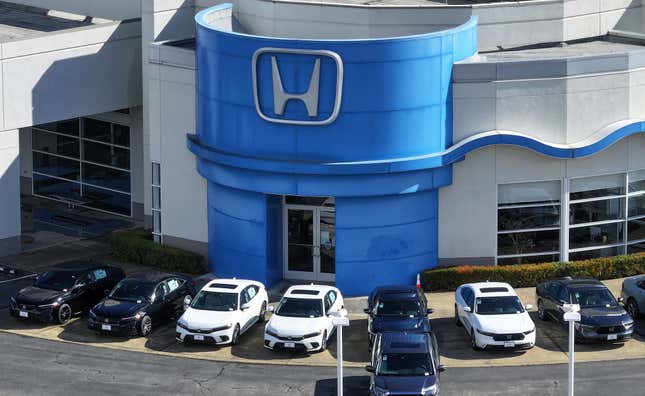
In This Story
Japanese automakers Honda (HMC) and Nissan (NSANY) both announced dismal earnings on Tuesday — and the worst may still be yet to come.
Honda’s operating profit fell 76% year-over-year for the period ending March 31, while net profit for the full year dropped 24.5% to 835.84 billion yen, or about $5.7 billion. Nissan, meanwhile, announced a plunge of nearly 94% in operating profit. The company registered a net loss of 676 billion yen ($4.5 billion) in its fiscal fourth quarter after clocking a 101.3 billion yen profit in the same period a year earlier. Operating profit declined by almost 88% year-over-year.
Nissan attributed the declines to falling in sales volume, rising sales incentives, and inflation. And all this is before the effects of President Donald Trump’s trade war take hold: The earnings, which run through the quarter ending March 31, don’t factor in the 25% tariff on all auto imports announced by Trump on April 2.
With those tariffs in mind, Honda downgraded nearly every financial metric for its current fiscal year when it announced its earnings. The automaker said it expects full-year operating profit to decline by almost 59%, attributing that drop to an expected $4.4 billion hit due to tariffs.
“Regarding the consolidated financial results for the fiscal year ending March 2026, the impact of tariff policies in various countries on our business has been very significant, and frequent revisions are being made, making it difficult to formulate an outlook,” the company said in a presentation accompanying its earnings release. “Moving forward, we will carefully assess the impact of tariff policies and expand recovery measures while aiming for further growth in operating profit.”
Nissan, meanwhile, also announced that it’s cutting 11,000 jobs and closing seven factories amid weak sales. That will bring the total number of layoffs at Nissan to 20,000 in the past year, which equals about 15% of its workforce.
Both companies sell a large number of the cars they manufacture in the U.S., so the impacts of tariffs will be massive. Japan has shown a willingness to negotiate with the U.S. over the tariffs, but Trump has prioritized negotiations with China over other trade partners, announcing a 90-day pause on the tariff war on Monday after conversations between the two nations over the weekend.
The next round of negotiations between the U.S. and Japan is expected later this month, according to the New York Times. Prime Minister Shigeru Ishiba has said that lower tariffs on Japan are a necessary component of any trade deal with the U.S.
Such a deal would be a welcome salvation for Japan’s auto industry — one that is the backbone of its economy and that, as of now, has a future ahead of its that’s murky at best and dire at worst.